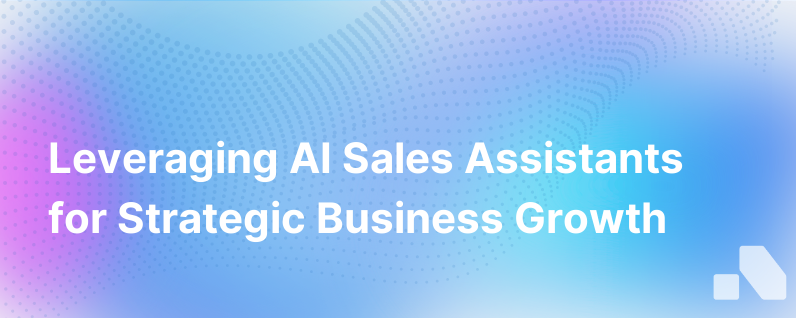
The modern sales landscape is a battleground where the fittest survive. In this arena, artificial intelligence (AI) has emerged as an indispensable ally. The AI sales assistant is not just a tool; it’s the digital avatar of a top-performing sales representative – one that doesn't sleep and continually evolves.
Navigating an ever-changing sales environment requires accuracy, efficiency, and a little bit of clairvoyance. This is where the AI sales assistant comes into play. With capabilities ranging from lead scoring and data analysis to providing real-time insights and automating routine tasks, AI assistants are revolutionizing the way sales teams operate.
Here’s an in-depth look at the importance of AI sales assistants in today's corporate combat zone.
AI Sales Assistants: The Game Changers
When we talk about AI in sales, we're not envisioning a future of robotic reps dialing up prospects. No, the application of AI in sales is much more nuanced and infinitely more powerful. Here's how:
Hyper-Personalization
Tailoring the sales pitch to align with specific buyer interests and pain points has never been more critical. With the data-crunching prowess of AI, sales assistants can analyze vast amounts of information to personalize communication at a level no human could possibly achieve alone. The result? Increased engagement and conversion rates.
Enhanced Lead Qualification
Sifting through leads to find those with genuine intent to buy can be like finding a needle in a haystack. AI algorithms excel at scoring leads based on various behavioral indicators and demographic data, thus determining which prospects are worth pursuing. By prioritizing high-intent leads, sales reps can focus on nurturing the right relationships.
Efficient Time Management
Time is the scarcest resource in the sales world. AI assistants automate routine tasks such as scheduling meetings, follow-up emails, and data entry. This liberation from administrative drudgery allows sales teams to devote more time to closing deals rather than managing calendars.
Real-Time Assistance
In the heat of a sales call, having an information wingman is invaluable. AI sales assistants can provide real-time insights, competitive information, and responses to objections. This enables sales reps to navigate conversations with confidence and accuracy, even when faced with left-field enquiries.
Predictive Analytics
Imagine knowing which deals are likely to close and which might slip away before it happens. Predictive analytics powered by AI can anticipate sales outcomes based on historical data patterns. This foresight allows sales managers to take preemptive measures to steer the ship towards positive waters.
Training and Onboarding
New sales hires need not feel adrift in the deep end. AI sales assistants can play a central role in onboarding by offering interactive training, thereby reducing the ramp-up time for new team members to become effective.
Continuous Learning and Improvement
The AI sales assistant is constantly learning from new data, interactions, and outcomes. This machine learning capability means it gets smarter over time and is always up-to-date with shifting market trends and buyer behaviors.
Real-World Applications
Lead Nurturing
A company using an AI sales assistant might see a lead receiving a meticulously crafted email based on their recent website interactions, followed by a perfectly timed follow-up call the moment that lead's engagement metrics spike. The AI system detects these signals and prompts the sales rep to act exactly when the lead is most receptive.
Sales Forecasting
Another scenario might involve sales forecasting, where the AI assistant analyzes historical win rates, deal sizes, and cycle lengths to predict the quarter's revenue with stunning accuracy. Sales teams can then adjust their strategies in real-time to hit their targets.
Sales Call Analysis
Moreover, AI in sales can extend to analyzing calls and virtual meetings. After every customer interaction, the AI assistant can provide feedback on the sales rep's performance, highlighting effective tactics and suggesting improvements. This feedback can be tailored to individual learning curves and performance metrics.
User Experience Personalization
On the customer end, an AI-driven CRM could surface the most relevant product recommendations and content to prospects at various stages in the funnel, augmenting the overall user experience and journey.
Aomni – The Solution to Embrace
At the heart of these capabilities is the convergence of big data, artificial intelligence, and sales best practices. Tools like Aomni extract essences of the data deluge and distill them into actionable insights, contributing to all the aspects above and more.
For efficiency-driven sales teams, Aomni can be the silent partner that ensures you're always a step ahead. From generating real-time account research to delivering personalized sales content and competitive insights in mere minutes, Aomni encapsulates the true essence of automation and intelligence.
As we recognize and adapt to the importance of AI sales assistants, we can refine our sales strategies to be more targeted, efficient, and successful. With AI and a suite of tools like Aomni, the future of sales is not just about having data; it's about understanding it and acting on it comprehensively and instantaneously.
In conclusion, AI sales assistants are no longer a luxury; they are becoming a necessity. As the sales process becomes increasingly complex and data-driven, AI assistants provide the competitive edge needed to thrive. With their ability to analyze, predict, and automate, these intelligent systems empower sales teams to deliver exceptional results while staying agile in an unpredictable marketplace.